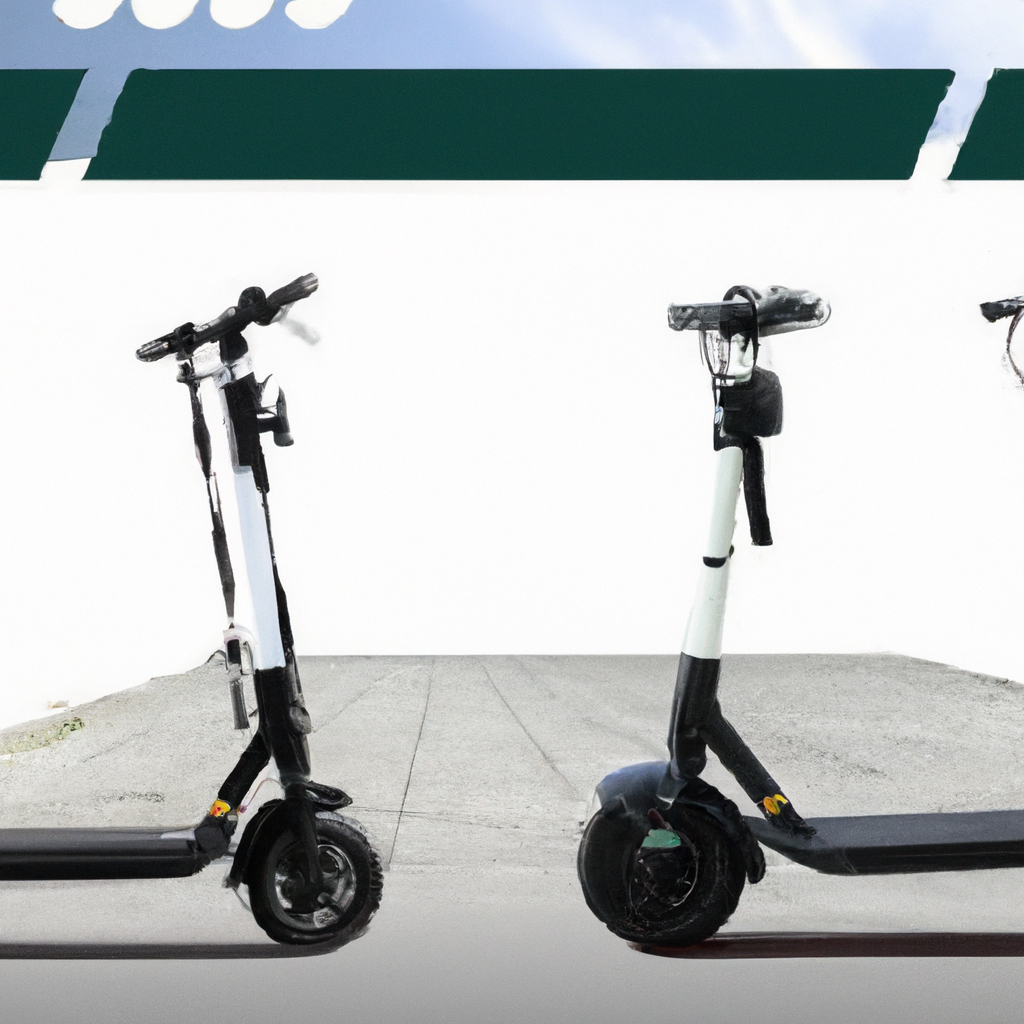Imagine a world where your daily commute becomes a stress-free and enjoyable journey, gliding through the bustling streets on an electric scooter. The idea of using electric scooters for commuting to work or school has gained popularity in recent years, but is it a viable option? In this article, we will explore the benefits and considerations of using electric scooters for your daily travels, providing you with the information you need to make an informed decision. So, hop on, and let’s discover the exciting possibilities of electric scooters as your ideal companion for your daily commute. Yes, you can! Electric scooters have become increasingly popular as a mode of transportation for commuting to work or school. They offer a range of benefits, including their environmentally friendly nature, cost-effectiveness, efficiency, and time-saving capabilities. However, before you hop on an electric scooter for your daily commute, there are several important considerations to keep in mind. In this comprehensive article, we will explore the benefits of using electric scooters for commuting, the key considerations before using them, how to choose the right electric scooter for your needs, the legal and safety issues you should be aware of, the benefits and limitations of commuting to work or school with an electric scooter, useful tips to enhance your electric scooter commuting experience, and alternative commuting options. Let’s delve into each section now.
Benefits of Using Electric Scooters for Commuting
Environmental Friendly
One of the primary advantages of using electric scooters for commuting is their environmental friendliness. Electric scooters are powered by rechargeable batteries and produce zero emissions, making them an excellent alternative to traditional gasoline-powered vehicles. By using an electric scooter, you can minimize your carbon footprint and contribute to a cleaner and greener environment.
Cost-effective
Compared to owning a car or relying on public transportation, electric scooters offer a highly cost-effective commuting option. The Cost of purchasing an electric scooter is significantly lower than that of a car, and the maintenance and operational costs are also much lower. Electric scooters require less maintenance, and the cost of electricity for charging is relatively inexpensive. Moreover, you can save money on fuel costs since electric scooters don’t require gasoline. All of these factors contribute to substantial cost savings in the long run.
Efficient and Time-saving
Electric scooters provide a quick and efficient mode of transportation, allowing you to navigate through traffic and reach your destination faster. With their agile maneuverability and compact size, electric scooters can easily navigate congested city streets and bypass traffic jams. They have the advantage of being able to take shortcuts and access areas where cars cannot go. By using an electric scooter, you can save valuable time during your daily commute, ensuring you arrive at your destination promptly.
Reduced Traffic Congestion
With the increasing number of cars on the road, traffic congestion has become a major challenge in urban areas. Electric scooters offer a solution to this problem by reducing traffic congestion. Since electric scooters are smaller in size, they occupy less space on the road and can easily weave through traffic. By using electric scooters for commuting, you can contribute to reducing traffic congestion, making the roads more efficient for everyone.
Health Benefits
Another significant benefit of using electric scooters for commuting is the potential health benefits they offer. When riding an electric scooter, you engage in physical activity, which can help promote cardiovascular fitness and overall well-being. Electric scooter commuting provides an opportunity to incorporate exercise into your daily routine, which is crucial for maintaining a healthy lifestyle. Additionally, riding an electric scooter can be an enjoyable and stress-free way to start your day, boosting your mood and reducing stress levels.
Now that you’re familiar with the benefits of using electric scooters for commuting, let’s discuss the considerations you should keep in mind before making this mode of transportation a part of your daily routine.
Considerations Before Using Electric Scooters for Commuting
Infrastructure and Safety Regulations
Before using electric scooters for commuting, it’s essential to consider the infrastructure and safety regulations in your area. Not all cities or regions have well-developed infrastructure to support electric scooter commuting. Ensure that your city or town has designated paths or lanes for electric scooters and follows safety regulations to ensure a safe riding experience. Familiarize yourself with the local laws and regulations regarding electric scooter usage to avoid any legal issues.
Range and Battery Life
Electric scooters have varying ranges, meaning they can travel a certain distance on a single charge. When considering an electric scooter for commuting, it’s crucial to evaluate its range and battery life. Determine whether the scooter’s range aligns with the distance you need to travel between your home, work, or school. Additionally, consider the charging time required for the battery to reach full capacity and ensure you have access to charging facilities at your destination.
Weather Conditions
Weather conditions can significantly impact your electric scooter commute experience. Electric scooters are generally suitable for fair-weather commuting, but heavy rain or snowfall can make riding dangerous and uncomfortable. It’s important to assess the climate in your area and consider alternative commuting options for adverse weather conditions.
Storage and Charging Facilities
As an electric scooter commuter, you need to have access to suitable storage and charging facilities. At your workplace or school, check if there are designated areas to park and charge your electric scooter. Ensure that these facilities are secure and can accommodate your scooter’s size. It’s also worth considering if you have adequate storage space at your home to safely store your electric scooter when not in use.
Traffic Laws and Regulations
To ensure your safety and the safety of others, it’s crucial to be aware of and follow traffic laws and regulations while using an electric scooter for commuting. Observe speed limits, traffic signals, and road signs. Familiarize yourself with the rules regarding electric scooter usage, such as where you can ride, what safety equipment is required, and whether helmets are mandatory. Being a responsible electric scooter commuter will enhance your safety and help you avoid any legal consequences.
Now that you have considered the important aspects before using electric scooters for commuting, let’s dive into choosing the right electric scooter for your needs.

Choosing the Right Electric Scooter for Commuting
Weight and Portability
When selecting an electric scooter for commuting, consider its weight and portability. A lightweight scooter is easier to carry and maneuver when needed. If you plan to combine your electric scooter commute with other modes of transportation, such as trains or buses, portability becomes even more crucial. Look for an electric scooter that is foldable and can fit comfortably in compact spaces.
Speed and Acceleration
Evaluate the speed and acceleration capabilities of electric scooters before making a choice. Different electric scooter models offer varying maximum speeds and acceleration rates. Consider the average speed you will need to maintain during your commute and choose an electric scooter with a speed and acceleration level that suits your requirements.
Battery Life and Range
Battery life and range are essential factors to consider when choosing an electric scooter for commuting. The battery should last long enough to cover your entire commute distance comfortably. Assess the scooter’s range and determine whether it meets your commuting needs. It’s also important to consider the charging time required for the battery to reach full capacity, ensuring it aligns with your commuting schedule.
Suspension and Comfort
To ensure a smooth and comfortable riding experience, examine the suspension system of the electric scooter. A good suspension system absorbs shocks and vibrations caused by uneven road surfaces. This feature is particularly important if you encounter rough terrains or encounter bumpy roads during your commute. Opt for an electric scooter with a suspension system that provides a comfortable ride, minimizing any discomfort or fatigue.
Safety Features
Prioritize safety when choosing an electric scooter for commuting. Look for features such as reliable brakes, headlights, tail lights, and reflectors. These safety features enhance your visibility, especially during rides in low light conditions or at night. Additionally, consider an electric scooter with a built-in horn or bell to alert pedestrians or other vehicles of your presence.
Now that you’re well-informed about choosing the right electric scooter for commuting, let’s address the legal and safety issues associated with using electric scooters for your daily travels.
Legal and Safety Issues of Using Electric Scooters for Commuting
Laws and Regulations
Before you start using an electric scooter for commuting, it’s crucial to understand and adhere to the laws and regulations governing their usage. Different countries, states, and cities may have specific laws regarding electric scooters. Familiarize yourself with speed limits, age restrictions, helmet requirements, and any other relevant regulations to ensure you comply with the law.
Safety Equipment
Wearing appropriate safety gear is vital when using electric scooters for commuting. Invest in a helmet that fits properly and provides sufficient protection for your head. It’s also advisable to wear reflective clothing or accessories, especially during low-light conditions, to increase your visibility. Elbow and knee pads are recommended, particularly for new or inexperienced riders. Prioritizing safety equipment can significantly minimize the risk of injuries while commuting on an electric scooter.
Visibility and Lighting
Enhancing your visibility on the road is crucial to avoid accidents and ensure your safety. In addition to wearing reflective clothing, consider attaching reflective stickers to your electric scooter. These stickers will make you more visible to other road users, especially during nighttime riding or in situations with poor visibility. Additionally, check that your scooter has working headlights and tail lights to provide adequate visibility to others on the road.
Sharing the Road with Other Vehicles
As an electric scooter commuter, sharing the road with other vehicles is inevitable. Familiarize yourself with the local road rules and understand your rights and obligations as an electric scooter rider. Observe traffic laws, signal your intentions, and be mindful of other road users, including pedestrians, cyclists, and motorists. Practice defensive riding techniques and maintain a safe distance from other vehicles to ensure your safety.
Awareness of Surroundings
When commuting on an electric scooter, it’s crucial to be aware of your surroundings at all times. Pay attention to what’s happening on the road, anticipate potential hazards, and be prepared to react accordingly. Avoid distractions such as using your phone or wearing headphones, as these can impair your ability to hear or see potential dangers. Maintain a heightened level of awareness to ensure a safe and enjoyable commuting experience.
Now that you’re aware of the legal and safety considerations of electric scooter commuting, let’s explore the benefits and limitations of using electric scooters for commuting to work or school.

Benefits and Limitations for Commuting to Work
Flexibility and Cost Savings
Using an electric scooter to commute to work offers great flexibility and cost savings. Electric scooters allow you to bypass traffic congestion, take shortcuts, and access areas where cars cannot go. This flexibility saves you time and reduces the stress associated with traditional commuting methods. Additionally, the low operating and maintenance costs of electric scooters result in significant cost savings compared to owning a car or relying solely on public transportation.
Parking and Traffic Advantages
Finding parking in busy urban areas can be a major hassle, especially during peak commuting hours. Electric scooters alleviate this problem by requiring minimal parking space. You can easily find a spot to park your electric scooter, even where car parking is limited or expensive. Moreover, electric scooters can maneuver through traffic and reach your workplace faster, ensuring you arrive on time without the frustration of being stuck in a traffic jam.
Distance and Terrain Limitations
While electric scooters are a convenient mode of commuting for short to medium distances, they may not be suitable for longer distances. Ensure that the range of your electric scooter aligns with your commuting needs. Additionally, consider the terrain you will encounter during your commute. Electric scooters perform best on flat and even surfaces; steep inclines or rough terrains may diminish their performance. Evaluate the distance and terrain of your commute to determine if an electric scooter is the most suitable option.
Safety Concerns on Busy Roads
Commuting to work often involves navigating busy roads with heavy traffic. Safety concerns may arise when sharing the road with large vehicles and dealing with motorists who may not be accustomed to sharing the road with electric scooters. Be cautious and vigilant, adhere to traffic rules, and maintain a safe distance from other vehicles. Consider alternative routes if possible to avoid heavily congested roads or high-risk areas.
Weather Dependency
Electric scooters are generally suitable for fair-weather commuting. However, adverse weather conditions such as rain or snow can make riding challenging and unsafe. Wet surfaces can reduce traction, increasing the risk of accidents. Before deciding to use an electric scooter for commuting to work, assess the climate in your area and consider alternative commuting options for unfavorable weather conditions.
Now, let’s explore the benefits and challenges of using electric scooters for commuting to school.
Benefits and Challenges for Commuting to School
Convenience and Independence
Electric scooters offer students a convenient and independent mode of transportation for commuting to school. With an electric scooter, you have the flexibility to plan your own route and travel at your own pace. Electric scooters can save time compared to walking or relying on school buses, allowing you to arrive at school promptly and avoid the hassle of waiting for transportation.
Environmentally Friendly Choice
As young individuals concerned about the environment, using an electric scooter for commuting to school aligns with the values of sustainability and environmental consciousness. By choosing an electric scooter over traditional modes of transportation, you contribute to reducing emissions and fostering a greener future.
Limited Speed and Distance
While electric scooters provide convenience for students commuting to school, their limited speed and distance capabilities should be considered. Most electric scooters have speed restrictions, ensuring safe and controlled riding for young riders. Additionally, the range of electric scooters may not be sufficient for long-distance commutes. Assess the distance and speed requirements of your school commute and ensure that an electric scooter can meet these needs effectively.
Safety Concerns in School Zones
School zones can be crowded, especially during peak hours when students are arriving or leaving. It’s essential to prioritize safety while commuting in these areas. Adhere to reduced speed limits and exercise caution around pedestrians, especially young children. Be mindful of parked cars, open car doors, and other potential hazards. Maintain a responsible and respectful presence in school zones, ensuring the safety of yourself and those around you.
Battery Life and Charging Constraints
Using electric scooters for commuting to school requires careful planning and consideration of battery life and charging constraints. Ensure that the range of your electric scooter is sufficient to cover your school commute comfortably. Take into account any extracurricular activities or social events that may extend your stay at school. If charging facilities are available at your school, take advantage of them to recharge your scooter during the day, ensuring you have enough battery power to get home.
Now, let’s move on to some useful tips that can enhance your experience when using electric scooters for commuting.

Tips for Using Electric Scooters for Commuting
Plan your Route in Advance
Before setting off on your electric scooter commute, plan your route in advance. Identify the most efficient and safest route to your destination, keeping in mind factors such as traffic congestion, road conditions, and designated electric scooter lanes. Consider using mapping apps or online tools that provide information specific to electric scooter routes.
Follow Traffic Rules and Regulations
Always observe traffic rules and regulations when commuting on an electric scooter. Adhere to speed limits, stop at traffic signals, and yield the right of way to pedestrians. Join the flow of traffic and use appropriate hand signals to indicate your intentions. Practicing responsible and lawful riding ensures your safety and fosters respect among other road users.
Invest in Safety Equipment
Investing in proper safety equipment is crucial for a safe electric scooter commuting experience. Purchase a well-fitting helmet that provides adequate protection for your head. Consider wearing knee and elbow pads to minimize the risk of injuries in case of accidents. Reflective clothing and accessories enhance your visibility, especially during low-light conditions. Prioritize safety equipment to significantly reduce any potential risks.
Maintain Regular Maintenance Checks
To ensure the optimal performance and safety of your electric scooter, conduct regular maintenance checks. Check the tire pressure, brakes, lights, and other components to ensure they are in proper working condition. If you notice any issues or abnormalities, address them promptly by consulting a professional or contacting the manufacturer.
Charge Battery Regularly
Proper battery management is essential for an uninterrupted electric scooter commuting experience. Charge your electric scooter regularly, preferably overnight or during periods when you don’t need it. Maintaining a full battery charge ensures that you have sufficient power to complete your desired commute distance. Avoid letting the battery run out completely, as this may lead to decreased battery life and performance over time.
Now, let’s explore some alternative commuting options if electric scooters are not a viable choice for you.
Alternative Commuting Options
Traditional Bicycles
Bicycles have long been a popular and proven mode of transportation for commuting purposes. They offer the benefits of being environmentally friendly, cost-effective, and promoting physical fitness. Bicycles are suitable for longer distances and varied terrains, providing you with a versatile commuting option.
Public Transportation
Public transportation, such as buses, trains, or trams, remains a reliable and convenient commuting option. Public transportation networks typically operate on established routes, ensuring you can reach your destination efficiently and affordably. By using public transportation, you contribute to reducing traffic congestion and minimizing your environmental impact.
Carpooling or Ridesharing
Carpooling or ridesharing is another effective commuting option, especially suitable for those who live near colleagues or neighbors. By sharing a ride with one or more individuals, you decrease the number of vehicles on the road, reduce fuel consumption, and share transportation costs. Coordinate with others in your area to establish a carpooling or ridesharing arrangement that suits your schedules.
Walking
For shorter distances, walking remains a simple, cost-free, and environmentally friendly commuting choice. Walking promotes physical exercise, improves overall health, and offers the flexibility to navigate through congested areas. Consider walking as an option if your workplace or school is within a reasonable walking distance.

Conclusion
When considering using electric scooters for commuting to work or school, it’s crucial to evaluate your personal needs, local infrastructure, and the pros and cons of electric scooter commuting. Electric scooters offer numerous benefits, including environmental friendliness, cost-effectiveness, efficiency, reduced traffic congestion, and health benefits. However, before incorporating electric scooters into your daily commute, it’s essential to consider factors such as infrastructure, safety regulations, range and battery life, weather conditions, storage and charging facilities, and traffic laws and regulations. Choose an electric scooter that is suitable for your needs, paying attention to weight and portability, speed and acceleration, battery life and range, suspension and comfort, and safety features. Be aware of the legal and safety issues associated with using electric scooters, prioritize safety equipment and visibility, and practice responsible riding. Commuting to work or school with an electric scooter provides benefits such as flexibility, cost savings, parking and traffic advantages, convenience, and an environmentally friendly choice. However, limitations such as distance and terrain restrictions, safety concerns on busy roads, and weather dependency should also be considered. Follow helpful tips such as planning your route in advance, following traffic rules and regulations, investing in safety equipment, maintaining regular maintenance checks, and charging the battery regularly. Lastly, if electric scooters are not suitable for your commute, consider alternative options such as traditional bicycles, public transportation, carpooling or ridesharing, or walking. Evaluate your personal circumstances, prioritize your preferences, and choose the most suitable commuting option that meets your needs effectively.

